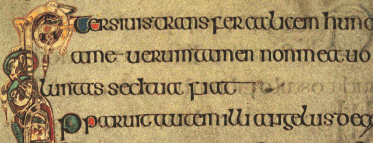

The technology of writing was invented as a means to extend the capacity of narrative to store information. Its appearance in the 4th millennium B.C. in Mesopotamia occurred when the level of governmental administration and commerce reached a complexity that was beyond the memory skills of those in power. As such, it was a class-based invention, only available to those near the source of the ruling power.
 Getting one's commitment
'in writing' firmly placed the 'truth' upon a distinguishable physical object,
the validity of which would be apparent by its mere existence. The
authentication of truth was transferred to a device exterior to the narrative.
Thoughts could be transferred remotely without the originating human present.
The material became more powerful than the spoken.
Getting one's commitment
'in writing' firmly placed the 'truth' upon a distinguishable physical object,
the validity of which would be apparent by its mere existence. The
authentication of truth was transferred to a device exterior to the narrative.
Thoughts could be transferred remotely without the originating human present.
The material became more powerful than the spoken.
The less tangible skills of individual memory were demeaned as being an unreliable vessel for storing valuable information about the activities and justifications of a society. The Logos, the spoken word that set the universe in motion, was replaced by the sacred text. Industries sprang up for the preservation and dissemination of such texts. The ancient genealogies were converted from the centuries old technologies of oral tradition to the newer media of the manuscript. Collective oral knowledge was selected, refined, and transmuted by those in power into what they believed to be the immutable mementos of a past that supported their preeminence to power. Such a past was considered superior to the one described by living memories. Manuscript culture erased the history of previous media as well as the extensive individual memory skills required to support such a culture. The technology of speech receded from its eminent position, of magically being able to transfer thoughts from mind to mind, and writing gave collective human knowledge, and the sense of self, the enhanced illusion that it was outside mortality and change.
Oddly enough however, the skills of vocal narration were not diminished by this development. The public presentation of established, processed knowledge that had become encapsulated within writing was dependent upon those who could interpret the scripts to those masses who had not yet been initiated into its secrets. Story tellers became replaced by rhetoricians. Even with the invention of movable type and the onset of print culture, manuscript culture was slow to fade because of the widespread lack of the technical skills of literacy. The apparatus of oral tradition was remodelled by rhetoricians for their own ends. As such, memory became a rhetorical skill, an aid at cueing orators in the vocal interpretations of texts.
In practice, memory was used in mechanically augmented 'gimmicks,' by rhetoricians for the presentation of a lengthy, complex speech. An Art of Memory was devised in Classical times as a prosthetic device to extend that part of an individual's oral memory skills which had been amputated due to the dependence upon writing to notate collective memories. This established Classical procedure has had a pervasive influence on the history of thought in our culture. However, it had been almost forgotten for centuries until relatively recently.